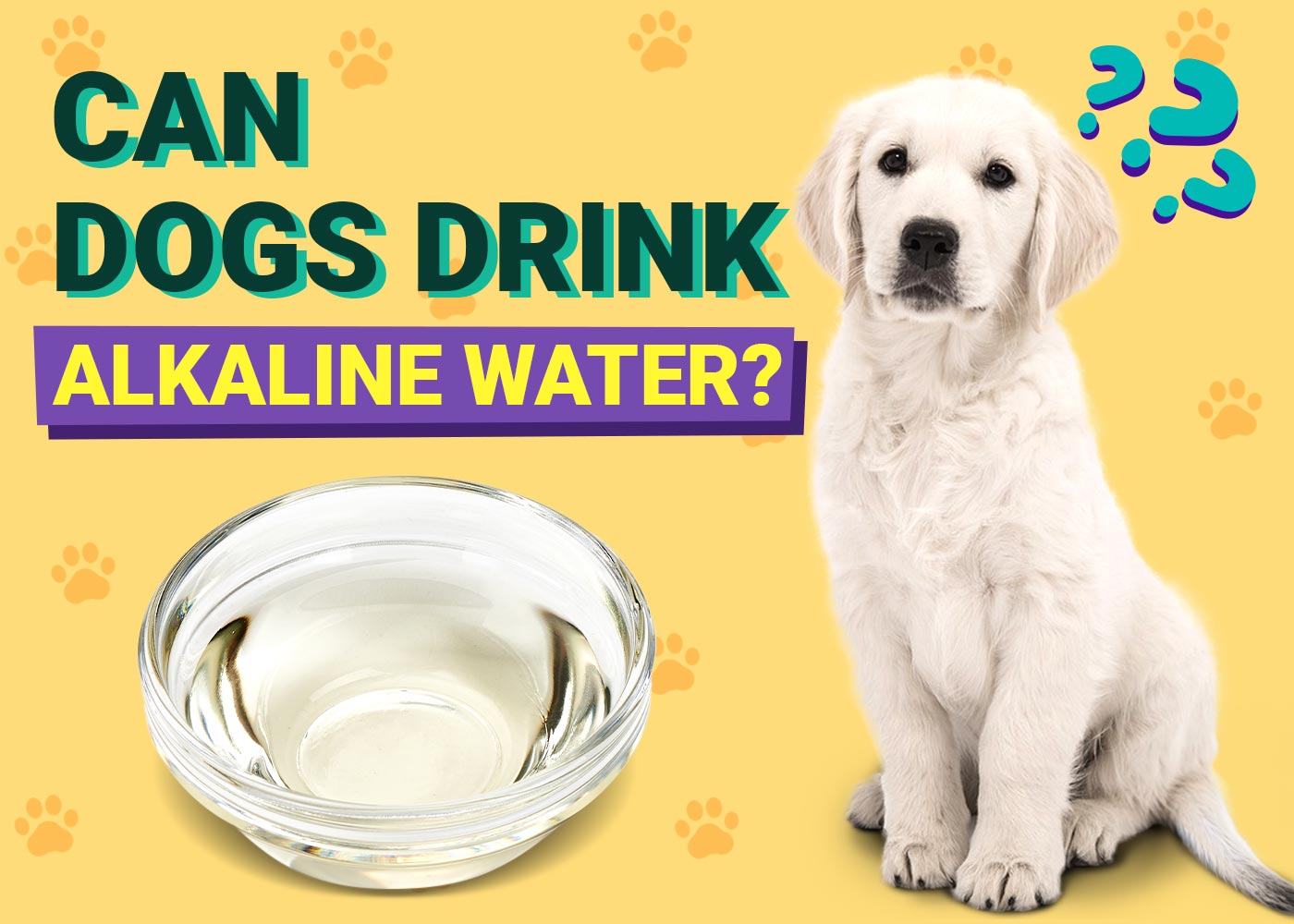Is alkaline water good for dogs? When it comes to your dog’s health, you want to make the best choices possible. You may have heard about alkaline water and its supposed benefits.
But is it really good for your furry friend? This question raises concerns that every dog owner should consider. While some people believe alkaline water can improve hydration and overall health, there are potential risks that could outweigh any perceived benefits.
We’ll dive deep into the facts about alkaline water for dogs. You’ll discover why it might not be the best option for your pet, what risks are involved, and what alternatives you can provide for optimal hydration. Keep reading to ensure your dog stays healthy and happy!

Credit: www.dogster.com
What Is Alkaline Water
Alkaline water has a higher pH level than regular water. It usually ranges from 7.1 to 14. This water contains minerals like calcium, magnesium, and potassium. These minerals can make it taste different. Some people think alkaline water has health benefits.
Many people drink it for better hydration. They believe it can help balance the body’s acidity. This balance can support overall health. Some say it helps with digestion and skin health.
Alkaline water is often created through a process called electrolysis. This process separates water into alkaline and acidic components. Many bottled brands offer alkaline water for sale.
Some pet owners consider giving alkaline water to their dogs. They think it might improve their pets’ health. However, it is important to understand the risks involved.
Dogs’ Natural Ph Balance
Understanding your dog’s natural pH balance is essential for their overall health. Dogs, like humans, have a specific internal environment that keeps their bodies functioning optimally. Disrupting this balance can lead to various health issues, which is why the question of whether alkaline water is good for dogs deserves careful consideration.
What Is The Natural Ph Level Of Dogs?
A healthy dog typically has a slightly acidic pH level ranging from 6.0 to 7.0. This range is crucial for various bodily functions, including digestion and urine formation. Any significant deviation from this range can lead to health complications.
How Does Alkaline Water Affect Ph Balance?
Alkaline water has a higher pH level, often above 7.5. Introducing this type of water into your dog’s diet can disrupt their natural acidity. This disruption may lead to issues such as urinary tract infections or the formation of kidney stones.
Signs Of Ph Imbalance In Dogs
- Frequent urination or difficulty urinating
- Blood in urine
- Excessive thirst
If you notice any of these signs, consult your veterinarian immediately. Your dog’s health is at stake.
What Should You Offer Instead?
Fresh, clean water is always the best option for your dog. Filtered tap water or bottled spring water can provide hydration without altering their pH balance. Consider using a Brita filter to remove impurities, but avoid distilled water, as it may lack essential minerals.
Have you ever noticed how your dog reacts to different types of water? My dog, Bella, always seems more energetic and playful after sipping from her favorite filtered bowl. This simple observation highlights the importance of clean water in your dog’s life.
Taking care of your dog’s hydration needs is crucial. Always prioritize their natural pH balance to keep them healthy and happy.
Potential Benefits For Dogs
The idea of providing alkaline water to dogs has gained some attention in recent years. Many pet owners wonder if this type of water could offer benefits similar to those claimed for humans. However, it’s essential to weigh these potential benefits against the risks involved.
Improved Hydration
Some advocates believe alkaline water can enhance hydration in dogs. This is based on the idea that the smaller water clusters in alkaline water are absorbed more quickly. However, many veterinarians argue that regular fresh water is sufficient for your dog’s hydration needs.
Skin And Coat Health
There are claims that alkaline water can improve skin and coat health in dogs. The thought is that the minerals in alkaline water could nourish their skin. Yet, a balanced diet and proper grooming often provide all the necessary nutrients for a healthy coat.
Joint Health Support
Some studies suggest that alkaline water might help with joint issues in dogs. Owners with older or arthritic pets often search for solutions to ease their pets’ discomfort. While staying hydrated is important, the connection between alkaline water and joint health is still under scrutiny.
Have you ever noticed any changes in your dog’s health after switching water sources? Your observations could be helpful in understanding how different types of water affect our furry friends.
Ultimately, while there are some suggested benefits, the potential risks of giving alkaline water to dogs cannot be ignored. It’s vital to consult your veterinarian before making any changes to your dog’s water. They can provide tailored advice based on your dog’s specific health needs.
Risks Of Alkaline Water For Dogs
Alkaline water may seem beneficial, but it poses risks for dogs. Understanding these risks helps pet owners make informed choices. The effects on a dog’s health can be significant. Let’s explore the potential dangers associated with alkaline water.
Disruption Of Natural Ph Balance
Dogs have a unique body chemistry. Their bodies function best with a slightly acidic pH level. Alkaline water raises this pH. This disruption can lead to health issues. Dogs may face digestive problems or discomfort.
Risk Of Urinary Problems
Alkaline water can contribute to urinary issues. It may lead to the formation of kidney stones. These stones can cause pain and discomfort. They may also require expensive veterinary treatment. This risk is not worth taking.
Not A Significant Benefit
Most healthy dogs do not need alkaline water. There is no solid proof of its benefits. Regular water provides necessary hydration. The potential risks outweigh any perceived advantages.
Impact On Urinary Health
Understanding the impact of alkaline water on your dog’s urinary health is crucial. Dogs naturally have slightly acidic urine. This acidity helps prevent urinary issues. Alkaline water can disrupt this balance. It raises the pH level of their urine.
Higher pH levels can lead to several problems. Urinary stones are a common concern. These stones can cause pain and discomfort. They may even require surgery to remove. A diet that includes alkaline water may increase the risk of these stones.
Moreover, alkaline water may affect kidney function. Kidneys filter waste and balance pH levels. If the urine pH becomes too high, it can strain the kidneys. This can lead to further complications over time.
Pet owners should be cautious. Monitoring your dog’s urinary health is essential. Regular vet check-ups can help detect issues early. Providing fresh, clean water is a safer choice. It supports healthy urinary function without the risks.

Credit: www.simpurelife.com
Common Myths Debunked
Many myths surround alkaline water for dogs. Some believe it is a miracle solution for all pet health issues. Others think it can cure specific ailments. These misconceptions can lead to confusion and potential harm. Let’s clear up these myths with facts.
Myth 1: Alkaline Water Is Essential For Hydration
Some people claim alkaline water hydrates dogs better than regular water. This is not true. Dogs need fresh, clean water. Their bodies do not require alkaline water for hydration.
Myth 2: Alkaline Water Improves Health
Many believe alkaline water can cure illnesses in dogs. Scientific evidence does not support this. A balanced diet and regular vet visits are more effective for keeping dogs healthy.
Myth 3: Alkaline Water Prevents Urinary Issues
Some think alkaline water helps prevent urinary problems. In reality, it can cause issues like kidney stones. Dogs thrive on slightly acidic water. Changing this balance can create health risks.
Myth 4: All Dogs Benefit From Alkaline Water
Not all dogs benefit from drinking alkaline water. Each dog is unique. What works for one dog may harm another. Always consider individual needs and consult a vet.
Myth 5: Alkaline Water Is Safer Than Tap Water
People often assume alkaline water is safer than tap water. This is misleading. Tap water is generally safe for dogs. Alkaline water can introduce unwanted minerals and disrupt their pH balance.
Alternatives To Alkaline Water
While alkaline water is often discussed, many alternatives suit dogs better. These options provide hydration without disrupting their natural pH balance. Focusing on safe and healthy hydration is essential for your pet’s well-being.
Consult Your Vet
Before changing your dog’s water source, talk to your veterinarian. They can guide you on the best options for your pet’s health. Each dog has different needs, and your vet knows what is best.
Fresh, Clean Water
Always provide your dog with clean and fresh water. Tap water is often a great choice. Make sure it is filtered for any impurities. Dogs need easy access to water throughout the day.
Filtered Water
Consider using a water filter, like a Brita. This can remove harmful substances from tap water. Filtered water can be a safe alternative for your dog. It ensures they stay hydrated without any risks.
Bottled Spring Water
Bottled spring water is another option. It contains natural minerals and is free from contaminants. Ensure it is a brand that you trust. Dogs may enjoy the fresh taste of spring water.
Avoid Distilled Water
Some vets advise against using distilled water for dogs. It lacks essential minerals that dogs need. Always check with your veterinarian before offering new types of water.

Credit: www.amazon.sa
When To Consult A Veterinarian
Consulting a veterinarian is vital for your dog’s health. Alkaline water may not be safe for all dogs. Understanding when to seek professional advice is crucial. Certain situations call for immediate attention.
Signs Of Distress
If your dog shows signs of discomfort, visit the vet. Symptoms like vomiting, lethargy, or unusual urination need attention. These could signal a reaction to alkaline water.
Health Conditions
Dogs with existing health issues require special care. Conditions like kidney problems or urinary tract infections may worsen with alkaline water. Always discuss any changes with your vet.
Dietary Changes
Any time you change your dog’s diet or water source, consult your vet. This includes switching to alkaline water. Your vet can guide you on safe options.
Routine Check-ups
<pregular are="" based="" can="" check-ups.="" discuss="" dog’s="" during="" for="" health.="" important="" needs.`
Safe Hydration Tips For Dogs
Alkaline water is not typically recommended for dogs. It can disrupt their natural pH balance, potentially leading to urinary problems. Providing clean, fresh water is the best option for keeping your dog hydrated and healthy. Always consult a vet before changing your dog’s water.
When it comes to your dog’s hydration, ensuring they drink the right type of water is crucial. Many pet owners are curious about alkaline water and whether it’s suitable for their furry friends. While some may think alkaline water could improve hydration, it’s important to prioritize safety first. Here are some safe hydration tips to keep your dog healthy and happy.
Consult Your Veterinarian
Before introducing any new water source, chat with your vet. They can provide tailored advice based on your dog’s health and needs. Regular check-ups can help catch potential issues early. If you’re unsure about alkaline water, your vet can clarify any risks involved.
Provide Clean, Fresh Water
Always offer your dog clean, fresh water daily. Tap water is generally safe, but make sure it’s filtered to remove impurities. Dogs often prefer water that tastes fresh. You might notice your dog drinks more when the water is appealing.
Consider Filtered Water
Using a water filter can improve the taste and quality of your dog’s water. Filters like Brita can help remove chlorine and other contaminants. Your dog might show a preference for this cleaner option. It’s an easy step to take for their hydration needs.
Avoid Distilled Water
Some vets suggest steering clear of distilled water. It can lack essential minerals that your dog needs for optimal health. Stick to water sources that provide a balance of minerals. Keeping hydration simple is often the best approach.
Watch For Signs Of Dehydration
Stay alert for signs of dehydration in your dog. Symptoms may include dry gums, lethargy, or excessive panting. If you notice these signs, offer water immediately and consult your vet. Prompt action can make a significant difference in your dog’s health. Staying informed about your dog’s hydration is vital. What types of water does your dog prefer? Understanding their preferences can lead to better hydration habits.
Key Takeaways For Pet Owners
Alkaline water is not generally safe for dogs. It can disrupt their natural pH balance and lead to urinary issues. Always consult your vet for the best hydration options for your pet. Stick to clean, fresh water to keep them healthy.
When considering the best hydration options for your furry friend, you may have come across alkaline water. It’s important to understand how this type of water could impact your dog’s health. Here are some key takeaways for pet owners to help you make informed decisions.
Why Alkaline Water Might Be Considered
Some pet owners believe that alkaline water can provide various benefits for their dogs.
- It’s thought to improve hydration and overall health by introducing minerals.
- Some suggest it may be beneficial for skin and coat health.
- There are claims that it could help with joint issues.
While these points sound appealing, it’s essential to look at the bigger picture.
Why It’s Generally Not Recommended
Despite the potential upsides, the risks often outweigh the benefits.
- Disrupts natural pH balance: Dogs thrive on a slightly acidic pH level, and alkaline water can throw this off.
- Risk of urinary problems: Alkaline water may contribute to the formation of urinary and kidney stones.
- Not a significant benefit: For most healthy dogs, the lack of proven benefits makes alkaline water an unnecessary risk.
Have you ever noticed changes in your dog’s behavior or health after altering their diet? Small changes can have big impacts.
What To Do Instead
If you’re considering changing your dog’s water source, here are some practical alternatives.
- Consult your vet: Always check with your veterinarian before making any changes.
- Stick with clean, fresh water: Provide your dog with filtered tap water or bottled spring water.
- Consider Brita-filtered water: This option can help remove impurities from tap water.
- Avoid distilled water: Some vets advise against this for pets.
Your dog’s hydration is crucial. Think about what you’re currently giving them. Have you ever tried switching their water source? The right choice can make a significant difference in their well-being.
Frequently Asked Questions
Can I Give Alkaline Water To My Dog?
It’s not recommended to give alkaline water to dogs. Alkaline water can disrupt their natural pH balance, potentially leading to urinary and kidney stones. Stick to clean, fresh water for your pet’s hydration needs. Always consult your veterinarian before making changes to your dog’s water source.
What Is The Healthiest Water For Dogs To Drink?
The healthiest water for dogs is fresh, clean, filtered tap water or bottled spring water. This helps maintain their natural pH balance and hydration. Avoid alkaline water, as it can disrupt their health. Always ensure your dog has access to fresh water daily for optimal well-being.
What Ph Of Water Should Dogs Drink?
Dogs should drink water with a pH between 6. 5 and 7. 5. This range maintains their natural body balance. Always provide fresh, clean water for optimal hydration. Avoid alkaline water, as it can disrupt this balance and lead to health issues.
Consult your vet for tailored advice.
Can I Give My Dog Alkaline Water?
It’s generally not recommended. Alkaline water can disrupt your dog’s natural pH balance.
What Are The Benefits Of Alkaline Water For Dogs?
Some believe it may improve hydration and coat health. However, these benefits aren’t proven.
Does Alkaline Water Harm Dogs?
Yes, it can lead to urinary and kidney stones. Risks often outweigh any potential benefits.
How Does Alkaline Water Affect A Dog’s Ph Balance?
Dogs need a slightly acidic pH. Alkaline water can disturb this balance and cause health issues.
Is It Safe For Puppies To Drink Alkaline Water?
It’s not safe for puppies. Their bodies are sensitive and need regular water for hydration.
What Should I Give My Dog To Drink?
Fresh, clean water is best. Filtered tap water or bottled spring water are good options.
Can Alkaline Water Help With My Dog’s Joint Issues?
There’s no solid evidence that alkaline water helps joint problems in dogs. Stick to regular water.
Conclusion
Alkaline water may seem appealing for dogs, but caution is key. It can disrupt their natural pH balance, leading to health issues. Risks like urinary stones outweigh any potential benefits. Always prioritize your dog’s health by providing clean, fresh water.
Consulting a veterinarian ensures you make the best choices for your pet. Stick to what works best for your furry friend. Understanding their needs is essential for their well-being. Make informed decisions for a happier, healthier dog.

